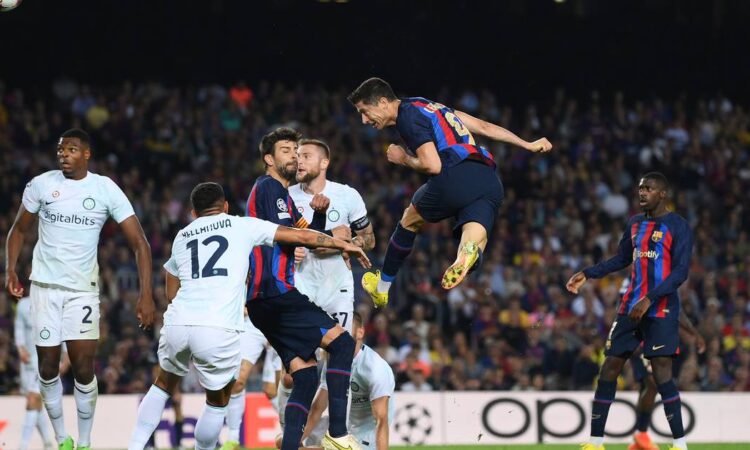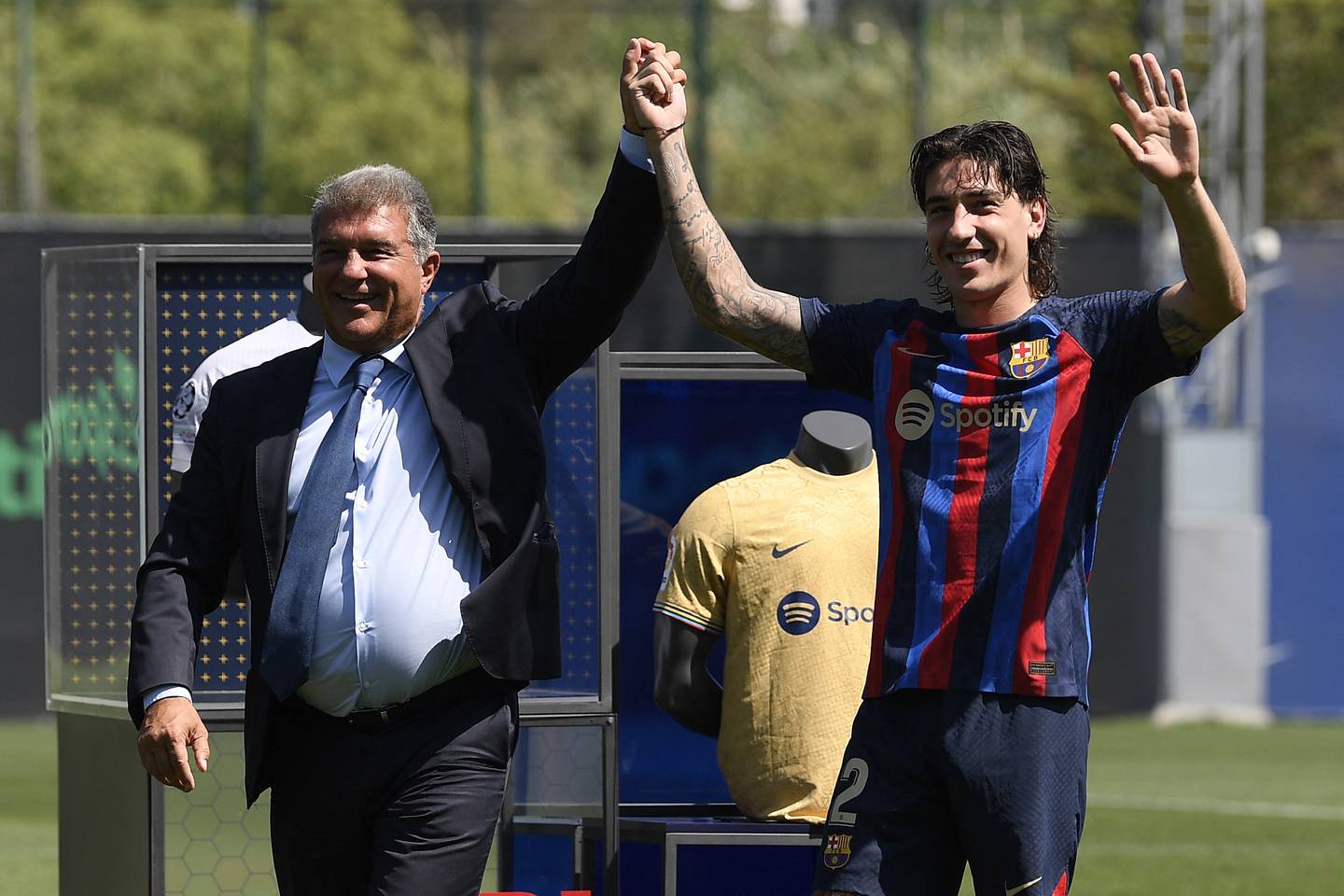Barça’s dubious decision to mortgage club future beginning to unravel already – The Irish Times

There was a festive atmosphere at Valdebebas, Real Madrid’s training campus, on Thursday morning. During the week, Real Madrid secured qualification for the knockout stages of the Champions League, as the reigning champions have done every season since the expanded tournament was created in 1992 — and that with two games to spare. They are the kings of Europe.
The players and staff joked and laughed, too, about the predicament of Barça, their eternal rivals. Baring a miracle, the Catalan club have been sentenced for the second consecutive season to compete in the Europa League, as they blundered again on a big European night, failing to defeat Inter Milan at the Camp Nou midweek in a must-win game, which finished 3-3.
Barça are in a mess financially. Last year, the club posted losses of €487 million. In the summer of 2021, the club was unable to keep Lionel Messi, who tearfully ran away to join the circus in Paris. Antoine Griezmann was forced out on loan. Barça were unable to afford their salaries. In October 2021, chief executive Ferran Reverter — a man with an impressive CV from the corporate world — declared the club “technically bankrupt”. In December 2021, the club ploughed ahead, approving a €1.5 billion funding plan for the Camp Nou’s renovation. Two months later Reverter quit, citing personal reasons. He hasn’t been replaced. The club’s president Joan Laporta, who didn’t like his pessimism, has taken on his duties.
Football has a capacity to surprise. In the summer, the football world was shocked, as Barça, like a man clinging to the rails in a casino, plundered future income, selling off assets, including 25 per cent of its La Liga TV rights until 2047 and 49 per cent of Barça Studies, to generate €865 million. It used the cash to meet La Liga’s stringent financial fair play rules; to splash €160 million on transfer fees for Robert Lewandowski, Jules Koundé and Raphinha; and to pay hefty salaries and bonuses for its “free” transfers, Franck Kessié, Héctor Bellerín, Marcos Alonso and Andreas Christensen, as well as contract renewals for Ousmane Dembélé, Sergi Roberto, Ronald Araújo and Gavi.
This season alone the wages of its three ‘captains’, Sergio Busquets, Gerard Piqué and Jordi Alba, cost €120m
The Covid-19 pandemic cratered Barça’s income, as it did to all football clubs. Barça’s problem was that it exposed a reckless spending regime. It has long lived beyond its means. Its salary mass is 77 per cent of its income. Uefa recommends that clubs shouldn’t surpass 70 per cent. This season alone the wages of its three “captains”, Sergio Busquets, Gerard Piqué and Jordi Alba, cost €120 million. The club is desperate to offload Piqué and Alba, whose contracts run until 2024, in particular. Both are no longer starters.
During the exuberance of its summer spending spree, Mateu Alemany, the club’s director general, was applauded in the Catalan press for his ability to outmanoeuvre rival clubs like Chelsea for players’ signatures, scoring “goals with his magic phone”. Less was said about his poor selling record. Philippe Coutinho, who was brought for €160 million including add-ons, was sold to Aston Villa for €20 million; Griezmann, bought for €135 million, was sold back to Atletico Madrid for €20 million. Miralem Pjanic, who was ostensibly bought for €60 million (in a player swap with Arthur Melo in 2020), was released on a free transfer to a United Arab Emirates club.

Laporta — who returned to the presidency last year — has doubled down: he argues that the club must spend its way out of crisis or risk becoming irrelevant and unattractive for sponsors, an also-ran like the once mighty AC Milan who have not been competitive in European football for more than a decade. Laporta is trying to repeat a formula that was successful when he took over the club’s presidency in 2003. At the time, Barça’s debt was almost double its income. He turned the ship around, thanks to glorious eras spearheaded by Ronaldinho and Messi (until he stepped aside as president in 2010 for an abortive career in politics). Success on the field helped generate more income off it. Every year revenue and salaries increased until the pandemic hit.
What is significant now about his bold move to kick-start Barça’s revenue-earning engine — by mortgaging the club’s future — is that the president and his board are no longer liable for losses sustained during their mandate. To run for president, he stumped up a guarantee of €125 million. Recent changes to the club’s statutes, however, mean he doesn’t incur any personal risk. It’s the club’s money he’s betting with this time around, not his own.
“We’ve saved Barça,” he boasted at a members’ assembly last week. With an October exit in the Champions League imminent, his words reek of delusion. He’s left it to coach Xavi Hernández and his embattled players to save his bacon.
Real Madrid smell blood. Anxious to avenge a 4-0 defeat last spring in the fixture, they know a heavy win could be a death knell for Xavi’s project
On Sunday, Barça face Real Madrid at the Santiago Bernabéu Stadium. Both sides are undefeated in La Liga, joint leaders at the top of the table. The clásico invariably has a huge bearing on the title race, beyond the points at play, because of the emotion and momentum a win affords. It has been years since as much has been riding on the result — certainly not since Barça lost 2-1 at the Camp Nou in April 2012 to cede the championship, a defeat which signalled the end of Pep Guardiola’s reign as coach.
Real Madrid smell blood. Anxious to avenge a 4-0 defeat last spring in the fixture, they know a heavy win could be a death knell for Xavi’s project.
The Lewandowski effect
In August, Robert Lewandowski was unveiled as a Barça player at the Camp Nou stadium. Almost 60,000 fans showed up to watch him do some keepy-uppies. It was a gamble by Barça to pay €45 million for a striker who was turning 34 years of age — and also to give him a four-year contract. He had to dig in to secure an exit from Bayern Munich. But the Polish striker has kept his side of the bargain.
Lewandowski has generated huge excitement around the club. Barça jerseys with his name are selling in the city like churros, as they say in Spain. He’s precipitated a staggering jump in gate attendance. Last season, the Camp Nou was averaging 55,000 a game; this season, more than 80,000 are streaming in to see him score his goals — 14 in 12 games. “When Lewandowski scores, Barça wins,” goes the refrain. It’s what his coach Xavi hopes will happen when he plays in his first clásico on Sunday.
La Liga: Real Madrid v Barcelona
Sunday, Santiago Bernabéu, 3.15pm






